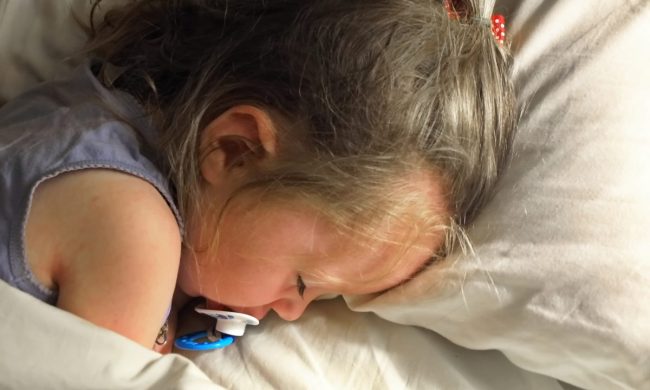Any parent with a newborn knows those bleary-eyed, sleepless nights all too well. New babies wake to feed so often that parents and babies don’t sleep through the night for months, but if sleep is so important for brain development, is there a point where there is cause for concern? Is there an age where children absolutely require more sleep not to stunt growth?
“Adequate sleep is essential for infants, both to ensure proper brain development and to minimize the risk of later problems with attention, behavior, and mood,” writes Dr. Polly Moore, Director of Sleep Research at California Clinical Trials in Los Angeles. “In children, there are established associations between short (or irregular) sleep and poor school performance, school absences, weight gain and obesity, mood changes, alterations in ability to manage emotions or deal with failure, impulsivity, and attention difficulties. Prospective studies show that sleep problems in infancy or early childhood increase the risk of later development of depression and anxiety, alcohol and substance abuse, behavior problems, attention disorders, sleep disorders, and obesity.”
Those risks sound scary, but don’t jump to panic until you read all you need to know about if lack of sleep could stunt your child’s growth.

What causes lack of sleep
If you’re concerned about your child’s sleep, speak with your pediatrician. Some medical conditions can cause your child not to get enough sleep, like sleep apnea. Anxiety, stress, or ADHD can also disrupt sleep, and if your child is old enough for drinks other than milk, make sure they are not having drinks with caffeine, like soda. Moreover, pre-nap routines for children can help with good sleep habits.
Regarding infants – you may have been desperately seeking for crib sleeping solutions for babies. But waking throughout the night is completely natural, and babies develop just fine without more than a few hours of sleep at a time. All babies wake in their crib during the night — you just might not know it if they don’t cry. Adults often wake during the night, too, we just don’t all remember it because it can be so brief.
What not to worry about
If you feel like your baby isn’t getting “enough” sleep, don’t fret. Simply sleeping less than studied averages is no cause for concern. Dr. Gwen Dewar, citing a 2020 study, writes that “more than half of all 6-month-olds get at least 12 hours of sleep each day. Yet a sizeable percentage of babies — who appear to be otherwise healthy — sleep substantially less. So merely sleeping less-than-average doesn’t mean your baby has a problem.”
Waking at night isn’t the problem — it’s if you’re seeing overtired-baby symptoms that concern you. If your baby is simply tired, they may yawn and rub their eyes. If they’re overtired, they will start to have a lower frustration and pain threshold, become more difficult to soothe, and cry more. One night of poor sleep will not stunt growth, but chronic sleep deprivation makes it possible.

What concerns to address
Dr. Dewar suggests that “if you suspect your baby is routinely overtired and seems unusually hard to awaken, it’s worth discussing your concerns with your medical provider.” Chronic sleep deprivation can throw off people’s hormone balance at any age, including important ones like cortisol, a stress hormone. When we sleep, we release a hormone called human growth hormone (HGH), which is, of course, important for growth. It is possible that a child not getting enough sleep is not getting enough HGH and that could stunt growth, so if you think your child is showing symptoms of sleep deprivation, speak with their pediatrician.
Sleep apnea is one sleep disorder that can cause a child to be deprived of the necessary amounts of HGH for proper growth. A baby can drop from the 50th percentile in height and weight to the 10th percentile from lack of good sleep, but if the sleep apnea is treated with surgery, they can regain that growth entirely and get back on their original growth curve, according to this 2002 study.
In older children, this 1990 study showed a very small (almost negligible) decrease in height from lack of sleep, but the researchers wrote, “It is concluded that variation in sleep duration between children is unlikely to have an important influence on growth.”
Does lack of sleep stunt growth?
The bottom line is that lack of sleep can stunt growth, but that in many cases it won’t. It’s natural to wake up every night, especially for infants, and waking at night should not be a cause for worry by itself. If your child seems sluggish, irritable, moody, hyperactive, explosive, or groggy, they may be suffering from a lack of sleep that is interfering with their hormones. It’s hard to tell with babies and children of all ages what moodiness may be coming from (some tantrums are developmentally normal), so it’s best to ask your doctor if you’re concerned. They can screen for sleep apnea or other sleeping disorders that may by causing your child to be overtired and could stunt their growth.



